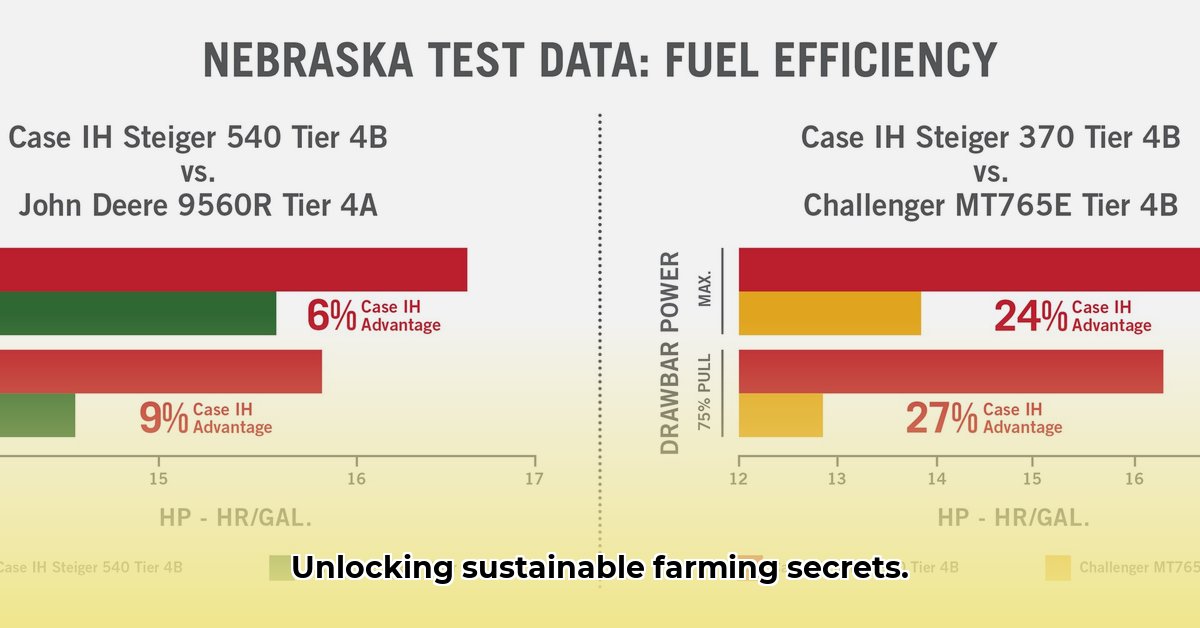
Nebraska's Tractor Test Laboratory (NTTL) plays a crucial role in advancing sustainable agriculture. Its standardized testing, aligned with OECD codes, provides invaluable data for evaluating tractor performance and environmental impact. This article explores the significance of these tests, the challenges to global adoption, and actionable recommendations for enhancing their influence on sustainable farming practices. For more information on sustainable farming practices, check out this helpful resource.
The Importance of Standardized Tractor Testing: A Level Playing Field
Without standardized testing, comparing tractor performance and environmental impact is akin to comparing apples and oranges. The OECD provides a framework of testing standards, ensuring consistency across different manufacturers and models. The NTTL, a leader in adhering to these standards, provides a benchmark of excellence. Its results offer crucial insights into fuel efficiency, emissions, and other key sustainability metrics – information vital for both farmers and manufacturers. How can we further refine this system to account for more factors inherent in various farming environments?
Challenges to Global Adoption and Data Accessibility: Bridging the Gap
While approximately 29 countries utilize the OECD testing system, global adoption remains fragmented. Inconsistent application of standards and limited data accessibility hinder comprehensive comparative analysis. Differences in testing methodologies and varying priorities among nations create an uneven playing field. Improving global data sharing and promoting uniform testing protocols are paramount for fostering informed decision-making across the agricultural sector. What strategies can best address this global data disparity and harmonize testing procedures?
Nebraska Test Results and Their Implications for Sustainability: Beyond Horsepower
Nebraska tractor test results reveal much more than simple horsepower figures. Fuel efficiency data, presented in various units (e.g., gallons per hour, pounds per horsepower-hour), are directly linked to greenhouse gas emissions. Lower fuel consumption translates to reduced environmental impact and potentially lower operating costs for farmers. These results provide critical insights for both farmers seeking sustainable options and manufacturers aiming to improve their designs. How effectively is the current data reflecting the diverse conditions found within varying agricultural landscapes worldwide?
Case Studies: Illustrating the Impact of Standardized Testing
Consider two tractors, both tested at the NTTL. One demonstrates exceptional fuel efficiency, minimizing its carbon footprint, while the other, while powerful, exhibits higher emissions. This direct comparison, facilitated by standardized testing, guides farmers towards environmentally conscious options and encourages manufacturers to prioritize sustainable design innovations. Such transparent comparisons are crucial for fostering responsible consumption and technological advancements. Can we expand case studies to encompass a wider range of tractors and their performance across diverse agricultural conditions?
Future Directions for Sustainable Tractor Technology: Expanding the Scope
To fully realize the potential of sustainable farming, standardized testing must expand beyond fuel efficiency and emissions. Future protocols should incorporate metrics related to water usage, soil health, and the overall life-cycle impact of tractors. Furthermore, advancements in engine design, alternative fuels, and precision agriculture technologies must be integrated into the evaluation process. How can we refine testing to account for the diverse contexts of farms within different ecosystems and farming practices?
Actionable Recommendations for Stakeholders: A Collaborative Approach
To maximize the impact of standardized tractor testing, various stakeholders must collaborate.
Tractor Manufacturers: Invest in research and development, focusing on advanced fuel-efficient technologies and transparent data reporting.
Research Institutions: Expand data collection across various climates and farming methods, refining testing protocols for enhanced accuracy and relevance.
International Organizations: Promote universal adoption of standardized testing, emphasizing uniform reporting and data accessibility.
Farmers: Utilize test data to make informed purchasing decisions, incorporating sustainability into overall farming strategies.
Governments: Provide incentives for sustainable agricultural technologies, fostering investment in improved testing infrastructures and policies that promote environmentally responsible practices.
Conclusion: A Path Towards Sustainable Agriculture
Nebraska tractor test results offer invaluable insights into improving the sustainability of agricultural practices. By promoting standardized testing, expanding data accessibility, and incorporating a wider range of environmental metrics, we can create a more environmentally friendly and economically viable future for the agricultural sector. Collaborative action is crucial to bridging the gaps in global adoption and realizing the full potential of standardized tractor testing to drive sustainable farming practices worldwide.